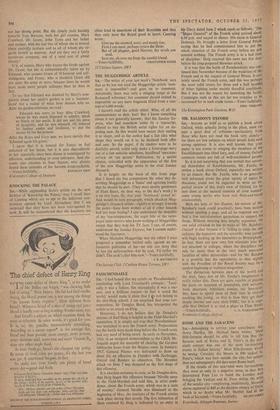MR. BALSDON'S OXFORD
StR,—Anyone so bold' as to publish a book about Oxford, while actually living in the place, must ex- pect a great deal of criticism—particularly from those who have not read the book very closely— for there are few subjects on which people hold such strong opinions. It is also well known that your paper is not averse to stinging the members of the Establishment into blind fury, and, of course, Oxford common rooms are full of well-established people.
So it is not surprising that you invited that univer- sal demolisher of Establishments, Mr. Fairlie, to review a book about Oxford, especially one written by an inmate. But Mr. Fairlie, who is so generally well informed about the great variety of topics he discusses, could not he expected to write an it'll' partial review of this don's view of Oxford, for he sees dons as the natural enemies of your venture- some young spirits who have real flesh-and-blood relationships.
With the help of this illusion, his review of Mr. Balsdon's book could practically have been written without opening a page, and all he required was xi find a few out-of-context quotations to support his thesis. Without entering into lengthy argument, the one solid criticism he has to make of `Mr. Balsdon'i Oxford' is that because it is 'failing to unite the two cultures, the humanist and the scientific, wise parents, will begin looking up the timetables to Birmingham.' In fact, there are now very few scientists who are not attached to colleges, where the disciplines can mix far more than in the very much separated faculties of other universities—and for Mr. Balsdon it is possible that the opportunity to dine nightly with the President of the Royal Society may be modest beginning to 'cultural integration.' The distinction between men of the world and the drab, fusty don of Mr. Fairlie's imagination is really rather thin. Dons arc quite capable of playing the parts on occasion of journalists, civil servants, bank chairmen, television comics, etc. InevitablY they have to spend most of their time in Oxford teaching the young, as that is how they get-their steady income and earn their FSSU, but it is argu- able that Oxford is as real a place as Fleet Street.
—Yours faithfully, . C. N. WARD-PERKINS Pembroke College, Oxford


































 Previous page
Previous page